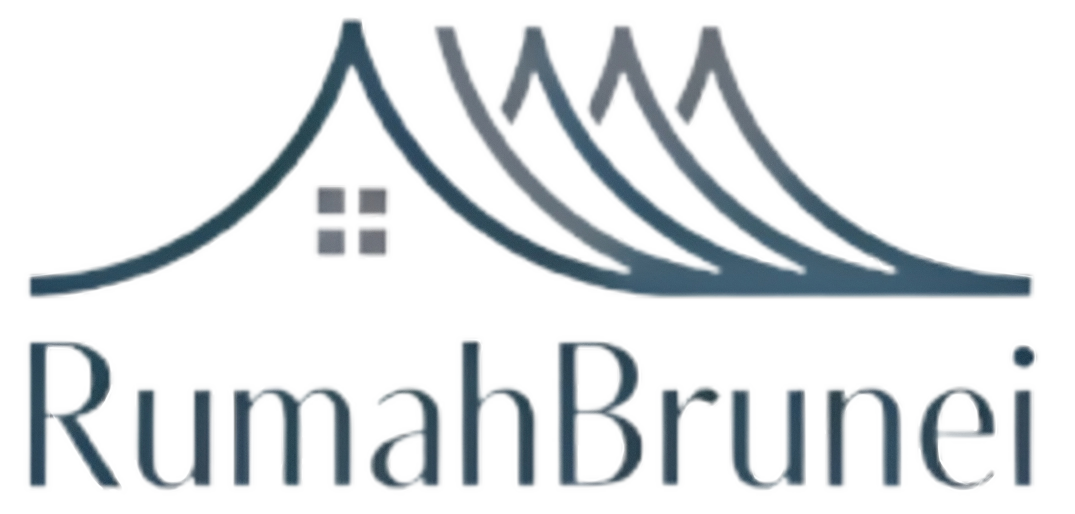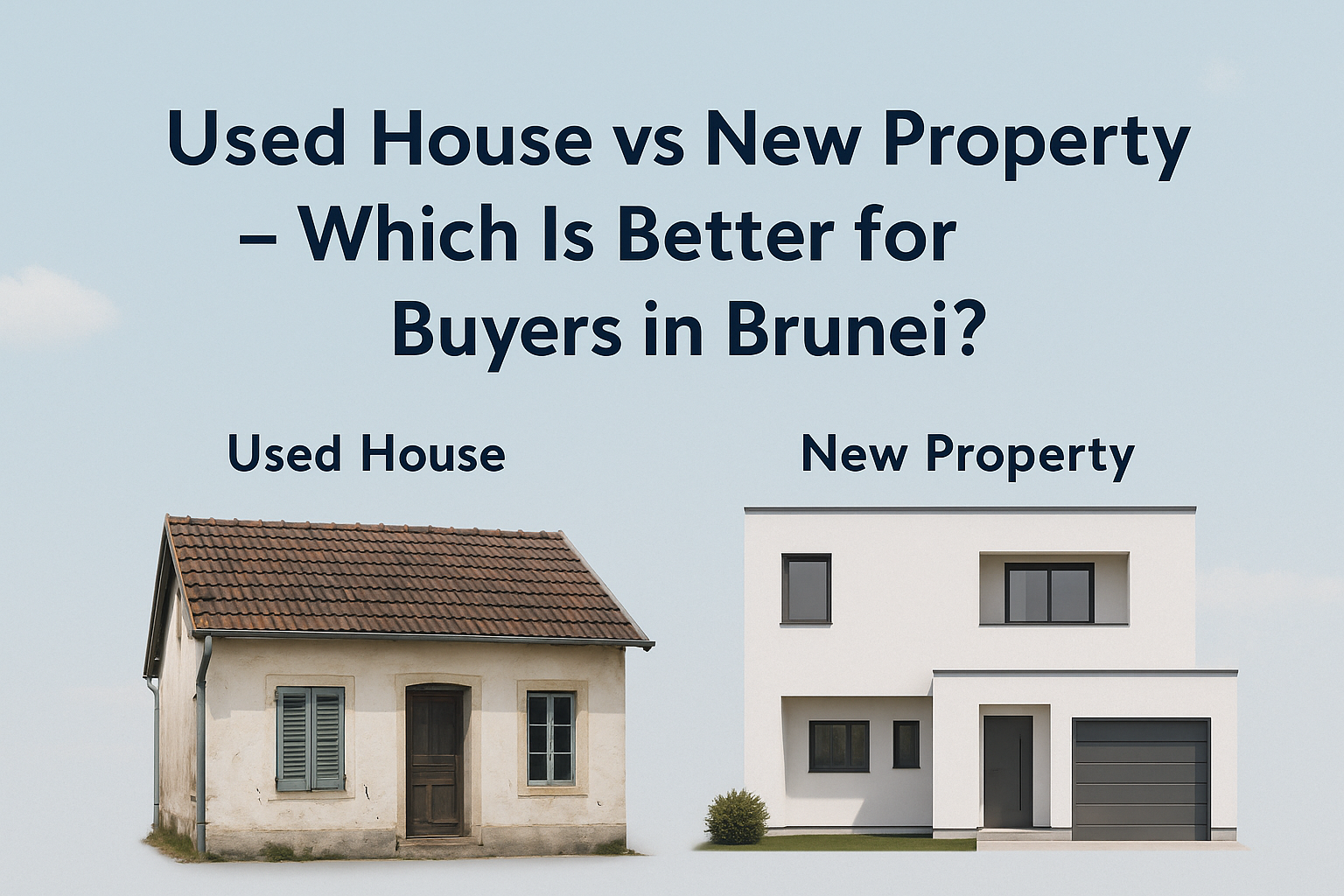Used House vs New Property – Which Is Better for Buyers in Brunei?
Table of Contents
- Financial Cost and Investment Potential
- Lifestyle Factors and Property Conditions
- Legal and Ownership Considerations in Brunei
- Conclusion: Deciding Based on Your Goals
Financial Cost and Investment Potential
Buying a used house in Brunei typically comes with a lower price tag compared to a brand-new property. Older homes often allow more room for price negotiation, and you might get a larger land area or a house in a well-established location for the same budget as a smaller new build. However, buyers should factor in renovation or repair costs for aging structures (e.g. fixing wear and tear, updating wiring or plumbing). Importantly, check the remaining land lease on a used property – many private lands in Brunei are held on 60-year or 99-year leases. If a house has a short lease left (due to being older or converted under past laws), its value can decline sharply as the lease nears expiry. For example, many properties converted to 60-year leases after 2012 have seen their values drop because of the shorter tenure, with significant depreciation as the end of the lease approaches. This can limit the long-term investment potential unless the lease is renewed (which is possible but subject to government policies and fees). On the upside, a used house in a prime location or with historical value might appreciate if land in that area is scarce.
By contrast, a new property (such as a newly built house from a developer or a new unit under a government scheme) usually commands a higher upfront cost. You’re paying for modern construction, new fixtures, and the convenience of a move-in-ready home. New properties often come with full remaining lease terms (e.g. a fresh 99-year strata title for a new condo, or a new 60/99-year lease for land) which can make them more attractive for long-term investment. There’s no immediate need for major repairs, and many developers offer short-term warranties on new houses for structural issues. In terms of investment potential, new properties in Brunei can hold their value well if the location is desirable or an up-and-coming area – for instance, a new housing estate near upcoming commercial developments might see values rise as the surrounding infrastructure grows. That said, buying new might mean paying a premium (developer profit and “new” premium), so the room for quick appreciation could be smaller in the short term. If you intend to rent out the property, brand-new homes may attract tenants more easily due to modern amenities. Keep in mind that government-built housing (like units under the National Housing Scheme) are heavily subsidised and cannot be resold on the open market or used as collateral by the owners – these homes are meant for social welfare rather than investment flipping. So, if you obtain a new house through a government housing scheme, its financial value is in providing you a home, not in resale profit.
Key financial considerations:
- Upfront Price: Used homes often cost less than new builds of similar size/location, but may require additional money for renovations.
- Maintenance Costs: An older house might need immediate maintenance or upgrades, whereas a new property will have minimal repair costs in early years.
- Lease Tenure & Value: Check how many years are left on the land lease. A used house with only e.g. 20 years remaining will have limited resale value, while a new property gives you a full term (60 or 99 years) to secure your investment.
- Financing: Banks in Brunei generally finance both new and old homes, but they will assess the property condition and remaining lease. A very old property with a short lease might be harder to finance or will have a shorter loan tenure due to the lease expiry risk.
- Long-Term ROI: Consider your goal – if it’s an investment, a used house in a high-demand area might yield good rental income or land value appreciation. If it’s your forever home, a new property with a long lease might give peace of mind for you and your heirs (no need to renew lease soon).
Lifestyle Factors and Property Conditions
Beyond dollars and cents, think about the lifestyle and comfort each option offers. A used house often comes in an established neighbourhood. This means you can observe the community vibe, available amenities (nearby shops, schools, mosques, etc.), and traffic conditions before buying. Older homes in Brunei may boast larger gardens or yard space and a bit of classic charm (some designs from the 80s or 90s have very spacious living areas). You might also benefit from mature fruit trees or landscaping planted by previous owners. On the flip side, an older property could have outdated layouts – for example, smaller bathrooms or a closed kitchen, whereas modern designs favor open-plan living. The property condition is a big factor: expect some wear and tear. It’s wise to do a thorough inspection; look for issues like roof leaks, termite damage, or old electrical systems that might need upgrading. If the previous owner maintained the house well, you could move in comfortably. But if not, you should budget time and money for refurbishments to suit your taste and ensure safety. The lifestyle in a used home can be very comfortable once renovated – you get the benefit of a settled location with your personal improvements. Plus, in a lived-in area, you likely already know who your neighbors are and the general social environment (quiet family area vs. busy mixed-use area, etc.).
A new property, by contrast, offers the thrill of being the first occupant. Everything is brand new – from the paint on the walls to the plumbing and appliances (if provided). Modern Bruneian houses or condos tend to incorporate newer trends like energy-efficient features, more bathrooms, larger windows for natural light, and contemporary finishes. For example, new housing estates might include community playgrounds, better road planning, and are built with today’s lifestyle in mind (extra parking spaces, provisions for fiber-optic internet, etc.). The lifestyle in a new property is often appealing if you prefer a home that’s move-in ready with minimal immediate work. You can also customize the interior design from scratch to your preference, since you’re not dealing with someone else’s renovations or old fixtures. However, a new development might be in a growing area – you may have to deal with ongoing construction in the neighborhood if the project is phased, or wait a few years for nearby shops and schools to be completed. Initially, the community might feel a bit sparse until more houses are occupied. Another consideration is that some new properties (especially those under construction) might face delays; be prepared for the possibility that your move-in date could be later than expected if construction schedules change.
Property condition advantages for new homes are clear: you shouldn’t have to worry about immediate repairs. Yet, new homes aren’t always perfect – do a handover inspection to catch any construction defects (like wall cracks or leaky fittings) so the developer can fix them early. Many buyers enjoy that a new home comes with modern safety standards and building code compliance, which can be a relief in terms of electrical and structural safety.
In terms of lifestyle preferences:
- If you love character and personalization, an older house gives you a canvas to renovate and might have unique features not found in cookie-cutter new estates.
- If you prefer convenience and modern comfort, a new property with brand-new facilities is very appealing. For instance, new condominiums might have facilities like gyms or security systems, and new landed houses could be designed with solar panels or rainwater harvesting in mind.
- Location might sway you: an older property could be closer to the city center or your workplace (since most new large housing projects in Brunei are in expanding areas outside the city), reducing commute times. Meanwhile, new properties might offer a quieter suburban lifestyle with a brand-new community of young families.
Legal and Ownership Considerations in Brunei
Brunei has some unique legal frameworks for property ownership that buyers must consider, and these can influence whether a used or new property is more suitable for you. A critical point is eligibility and ownership rights based on your citizenship status. Only Brunei citizens can own landed property (houses with their own land) in perpetuity or for long-term leases, as per national law. Permanent Residents (PRs) and foreign buyers face restrictions: they generally cannot own freehold land and are limited to leasehold purchases with government approval. In fact, since 2017, foreigners have been allowed to purchase property in Brunei, but only units under strata title (such as apartments or condominiums) for a lease term up to 99 years. They cannot be registered owners of land parcels. PRs are allowed to buy landed homes or land, but these come only as 60-year leasehold titles (not full freehold). So, if you are a PR or foreigner considering a used landed house, you’d need to navigate these legal limits – typically, a non-citizen cannot simply buy an old landed house from a citizen, unless special approval is granted by His Majesty in Council. On the other hand, a new property that is an apartment or a stratified unit might be viable for a non-citizen buyer within that 99-year limit.
For Bruneian citizens, both new and used properties are open for consideration, but there are still legal factors like land tenure to note. If the used house you’re eyeing is on a leasehold land, confirm how many years remain and inquire about renewal policies. The government has provisions for lease renewals (for example, certain cases may get waiver of renewal premium if the plot is small and owner-occupied as one’s only residence), but outcomes can vary. New properties will typically come with a fresh lease term (e.g. a new 99-year lease for a condominium unit, or a new 60-year term if a PR is buying a landed property in special cases). Brunei’s laws underwent changes in 2012 that impacted ownership: previously, some buyers (including foreigners) purchased land via power of attorney arrangements, but a law was introduced to restrict property ownership to citizens and converted those arrangements into 60-year leases. This means some older houses in the market might have that 60-year converted lease status – as a buyer, you should be aware if the title is in that category because it may have started its countdown in 2012, affecting how long is left.
Another aspect is the housing schemes specific to Brunei. The government’s public housing programs – namely the National Housing Scheme (RPN) and the Landless Indigenous Citizens' Housing Scheme (STKRJ) – provide many Bruneians with new houses or land grants. If you are a citizen who hasn’t owned property before, you might be on the waiting list or eligible for these schemes. The RPN offers ready-built houses to Brunei citizens of any racial background (allocated by application year), while STKRJ grants land and sometimes houses specifically to indigenous Bruneians (rakyat jati) These scheme houses are new properties in the sense that they are newly built by the government, and they come at highly subsidized costs (with very favorable loan terms from the government). The legal catch is as mentioned earlier: such homes cannot be freely sold or traded in the market, and ownership is meant to stay with the beneficiary family. So, if you’re considering an RPN house vs a market house, remember that an RPN house (new, subsidized) gives you a great deal financially and a brand-new home, but you sacrifice resale ability – it’s essentially a one-time opportunity for a family home. A used house bought on the open market, however, is your asset to sell or leverage in the future (for citizens, there’s no restriction on selling a privately purchased property).
Also, consider legal processes: Buying a used house means you must ensure the title transfer is done legally and that the house isn’t under any disputes or encumbrances. Engage a legal advisor to check the land title, especially if it’s leasehold, and ensure all dues (like land tax or ground rent) are paid up by the seller. For new properties from developers, ensure the developer has obtained proper approvals (like the Occupancy Permit and land subdivision approval). In Brunei, it’s common that new housing developers hand over the property only after the authorities certify it. If you’re buying new, also check if the price includes the land title transfer fee and any stamp duties.
Conclusion: Deciding Based on Your Goals
Both used houses and new properties in Brunei have their advantages and trade-offs. There is no one-size-fits-all answer – the better choice depends on your personal goals, financial situation, and how you prioritize various factors:
- Budget and Investment Goals: If you’re on a tighter budget or looking for the best value per square foot, a well-maintained used house might be better. It can also be a good investment if in a prime area, as you have the freedom to resell later. However, if you want a property with maximal lease tenure for future generations or plan to stay long-term without worrying about renewal, a new property could be more reassuring. Remember, short remaining leases on old properties can hurt future value, so factor that in if long-term appreciation matters to you.
- Lifestyle Preferences: Consider how important a modern layout and new fittings are to your lifestyle. If you dream of a turnkey modern home with the latest design (and no need for renovation hassles), a new build is appealing. On the other hand, if you value a larger plot, established neighborhood, or the charm of an older home – and don’t mind doing some upgrades – a used house could offer a more satisfying lifestyle. Think about location too: older houses might put you closer to town or in mature communities, whereas new estates may be in emerging suburbs.
- Timeframe and Convenience: Are you willing to wait or work on the property? Buying new from a developer might involve waiting for construction to finish (or waiting on a housing scheme list for years), whereas a used house purchase can often be completed faster and you can move in as soon as sale formalities are done. If you need a house immediately, the resale market (used homes) offers ready options. If you’re not in a rush, you can consider booking a new unit and waiting for the ideal home.
- Legal Eligibility and Peace of Mind: If you are a Bruneian citizen eligible for a housing scheme and your priority is an affordable home for your family, applying for a new scheme house is worthwhile (just note you can’t sell it later). If you’re a PR or foreigner, your practical choice might lean towards newer strata-titled properties since landed used houses aren’t accessible to you legally. Also, some buyers simply feel more secure knowing a property is brand new with full legal compliance (especially after the 2012 law changes), versus an older property that might have a complicated title history. Weigh what gives you more peace of mind.
In the end, decide based on your personal goals: Make a checklist of what matters most – be it cost, location, size, modern features, or future resale flexibility. You might even consult local real estate agents or financial advisors for input on current market conditions. Brunei’s property market is unique with its high rate of government-provided housing and strict ownership laws, so taking the time to understand these local factors will help you make an informed choice. Whether you choose the character of a pre-owned house or the freshness of a new property, ensure it aligns with your long-term plans and family needs. An informed Bruneian buyer who considers financial, lifestyle, and legal aspects will be well on their way to a satisfying homeownership journey in the Sultanate.
News insight
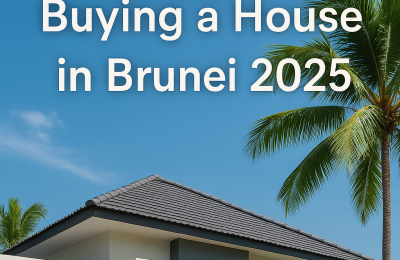 Sep 07, 2025
Sep 07, 2025
Buying a House in Brunei: What You Need to Know (Processes, Rules & Tips)
A practical guide to eligibility, freehold vs leasehold, the step-by-step process, fees, financing,...
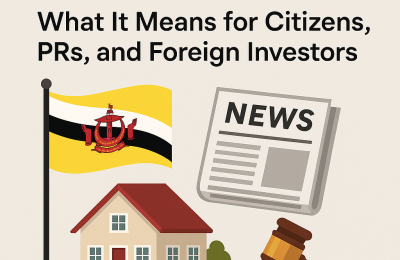 Aug 05, 2025
Aug 05, 2025
Brunei's New Land Code 2025: What It Means for Citizens, PRs, and Foreign Investors
Brunei's Land Code 2025 lets PRs own freehold homes and sets new rules for foreign property holders.
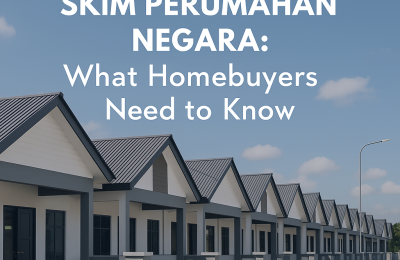 Jun 04, 2025
Jun 04, 2025
Understanding Skim Perumahan Negara: What Homebuyers Need to Know
Guide to Brunei’s RPN housing: who’s eligible, how to apply, and what’s new in 2025.
